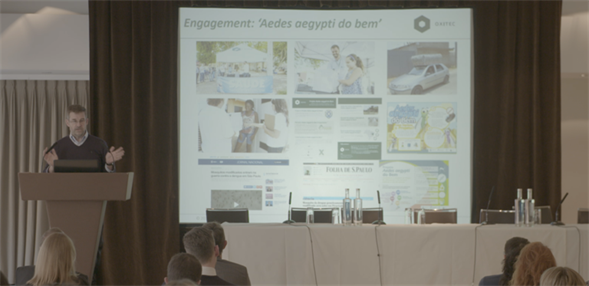On 21 March the World Health Organization (WHO) posted the conclusions and recommendations of the Vector Control Advisory Group (VCAG) meeting on 14-15 March 2016, regarding vector control tools for use in response to the recent Zika virus outbreak. After their review of several new tools with the potential to reduce vector populations, the VCAG issued a positive recommendation in support of Oxitecs self-limiting mosquito (OX513A).
Innovation and new technologies for vector-control & global health also featured at the recent The International Society for Neglected Tropical Diseases (ISNTD) Bites vector-control solutions conference held on 17 March in London.
ISNTD Bites is the annual vector control and disease surveillance conference bringing together professionals and innovators in the field of vector control solutions with colleagues from policy and research to achieve partnerships and deliver the rapid responses and longer-term programmes to address vector-borne diseases.
Through four focus sessions and panel discussions, the conference highlighted the window of opportunity for the field of vector-control to deliver advances in global health as well as long-term global development.
Amongst the speakers was Hadyn Parry, chief executive officer of Oxitec, who gave a talk illustrating the excellent entomological efficacy of the Oxitec approach for controlling Aedes aegypti. As Dr Julian Entwistle, a consultant with Xenex Associates reports: “At the meeting there was an interesting discussion about the difficulty, high cost and long time required to conduct trials to demonstrate the epidemiological impact of control of Aedes aegypti for transmission of dengue. It would be implausible to do this for Zika. Several participants argued that this requirement would hold back the implementation of urgently needed new approaches, whose epidemiological impact could be demonstrated in advance by modelling and could be monitored after implementation.”
So the announcement of a positive recommendation by the WHO’s Vector Control Advisory Group in support of Oxitec’s self-limiting mosquito could not have come at a better time.
Commenting on this, Oxitec’s CEO, Hadyn Parry said: “We applaud the efforts and leadership shown by the WHO. Their recommendation is a strong vote of confidence in the Oxitec mosquito as a potential tool in the fight against Zika, and is a positive step forward in the fight against the spread of mosquitoes that transmit disease. Oxitec continues to engage with communities that are in need of effective, scalable solutions to combat the dangerous Aedes aegypti mosquito, the primary vector for a number of harmful arboviruses including Zika, dengue and chikungunya.”
Commenting on the outcome of the ISNTD Bites meeting, ISNTD director, Marianne Comparet said: “There is now a big opportunity for the vector control community to show it effects important, rapid and lasting improvements in global public health, whether through established or novel methods and technologies – the alignment and collaboration between policy, partners in the field and industry needs accelerating across both the global health and vector control fields, and networks such as ISNTD are there to precipitate this.”
A feature article in Pest issue 43: February & March 2016 examined the background and likely threats posed by the spread of the Zika virus and the involvement of Oxitec’s self-limiting mosquito.

Haydn Parry speaking at the recent International Society for Neglected Tropical Diseases (ISNTD)
Bites vector-control solutions conference held on 17 March in London © Film Yard/ISNTD

